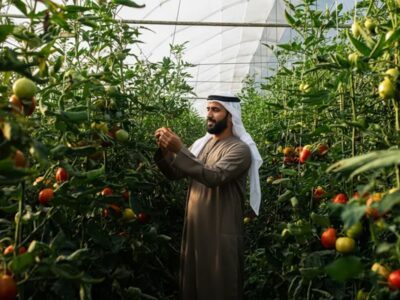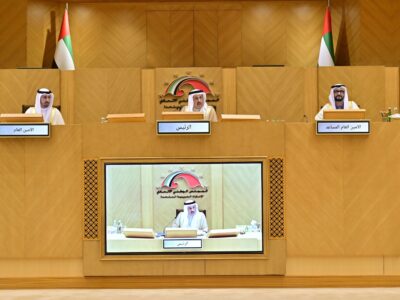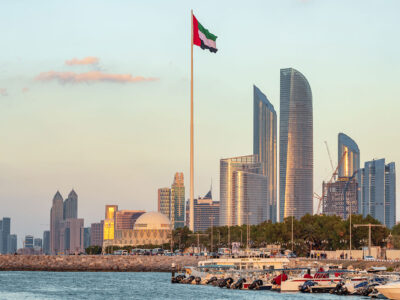Lord Edward Udny-Lister, co-chairman of the UAE-UK Business Council, cuts an authoritative figure, ensconced in the quiet environs of Alfred’s members club in London.
Following a long and colourful career in the British government, the politics veteran is now leveraging his considerable clout to help bolster Britain’s relationship with the United Arab Emirates.
“Now that the pandemic is receding, we are refocusing on the core government agenda,” he tells Arabian Business. “It’s a very exciting time for growing what has always been a very strong relationship between Britain and the UAE.”
When British Prime Minister Boris Johnson briefly hired Udny-Lister as special envoy to the Gulf earlier this year, the UK PM said the appointment marked his ambition to achieve a “wholescale modernisation of the Gulf relationship”, creating jobs and driving prosperity at home, while delivering on government priorities and values overseas.
Lord Udny-Lister, who is also a former chief strategic adviser to Johnson, has since stood down from government citing conflicting interests. Instead, he is channeling his years of Gulf experience and connections into the newly revamped UK–UAE Business Council.
“The council was created principally because the royalty and governments of both countries get on so well. It’s a strong relationship at a government level. The council was put together to deliberately strengthen those relationships. Boris Johnson is behind it; everybody is behind it,” he explains.
A win-win relationship
According to Lord Udny-Lister, the UK government had been taking its historically friendly UAE relationship for granted and not working as proactively as it could.
“It’s about working out our mutual priorities and working together to achieve them. It’s as simple as that. Activity between the Gulf and the UK has really ramped up this year – there are so many British officials in and out of the region,” he said.
The UK-UAE Business Council, a decade-old bilateral trade organisation, has more recently morphed into a serious thought leadership body.
 Ahmed Ali Al Sayegh.
Ahmed Ali Al Sayegh.
The council, which is co-headed by the UAE’s Ahmed Ali Al Sayegh, provides strategic advice to both governments on the interests and concerns of its member communities and the wider business society.
The council is also home to a Joint Secretariat that delivers campaigns, events and working groups to help deliver the ambitions of both governments to strengthen the bilateral trade and investment relationship.
The UK-Emirati relationship received a historic boost in September this year when the UAE announced it would invest £10 billion ($13.8bn) in priority sectors in the UK under the expanded UK Sovereign Investment Partnership (SIP).
The new investment tranche builds on an existing £800 million ($1.1bn) commitment to the life sciences sector made in March.
Under the Partnership for the Future bilateral framework, the UAE will invest in Britain’s technology, infrastructure and energy transition, as well as joint pledges on climate action.
“The Emiratis know what Boris Johnson wants. So when the Abu Dhabi Crown Prince Sheikh Mohamed bin Zayed al Nahyan visited the UK to sign the deal it wasn’t just about MoUs – it was about real cash and putting billions of pounds on the table,” said Udny-Lister.
More than money
He added that these are “very real” investment propositions. “Of course, these are very big deals, but what do the Emiratis actually want? They want a commercial return, but they also want wider transferable assets. Put simply, they are as interested in job creation and the future prosperity of British companies within the UAE as they are in straight investment.”
 UK Prime Minister Boris Johnson and Abu Dhabi Crown Prince Sheikh Mohamed bin Zayed al Nahyan.
UK Prime Minister Boris Johnson and Abu Dhabi Crown Prince Sheikh Mohamed bin Zayed al Nahyan.
He stresses that the special bilateral relationship must be mutually beneficial to be sustainable in the long-term.
“If it’s not two-way, the relationship is a waste of time. It’s not going to survive. Yes, maybe people will make some money when they sell out but that’s not where we are. We are looking for long-term propositions that benefit both parties.”
He says the UK-UAE Council aims to chime with the respective government visions. “We’re not going to go against the grain – why would we?”
This means shoring up support for the UK’s burgeoning focus on the Asia Pacific region, he says.
“As Britain looks to the East, the UAE provides a valuable springboard in terms of its location and relationships,” he adds. “The UAE has lots of Indian businesses and access to Asia, while Britain can help the UAE become a global hub.”
Upcoming trade deals?
Lord Udny-Lister says the new UK Trade minister Anne-Marie Trevelyan is thought to be ‘pro-Gulf’ and is masterminding a series of upcoming regional trade deals.
Britain announced earlier this month that it would take its first step towards trade negotiations with the GCC asking British businesses what they want an agreement to cover.
Trevelyan is said to be targeting a deal with the Gulf as she looks to build new ties around the world following Britain’s exit from the European Union.
On October 8 she launched a 14-week consultation, calling on the public and businesses to share their views on what a deal should look like. She also met representatives of the GCC in London.
“We want a modern, comprehensive agreement that breaks down trade barriers to a huge food and drink market and in areas like digital trade and renewable energy which will deliver well-paid jobs in all parts of the UK,” she said in a statement.
Lord Udny-Lister says he is confident such a deal will emerge – and soon.
“The UK-Gulf and UK-UAE trade deals will happen… they may start as piecemeal individual country deals and be finalised with an overall GCC deal,” he says, adding that a wider Gulf bloc deal would be focused on tariffs, while individual agreements may focus more on favourable business terms.
Looking to the future, Lord Udny-Lister says the UK has a critical role to play in the development of the UAE’s knowledge economy.
“Both countries are focused on the new industries, such as artificial intelligence, life sciences, and green energy – these are all sectors that the UK excels in,” he says. “What’s more, both countries have massive infrastructure plans. Now is the time to turn all of these ideas into reality together.”





